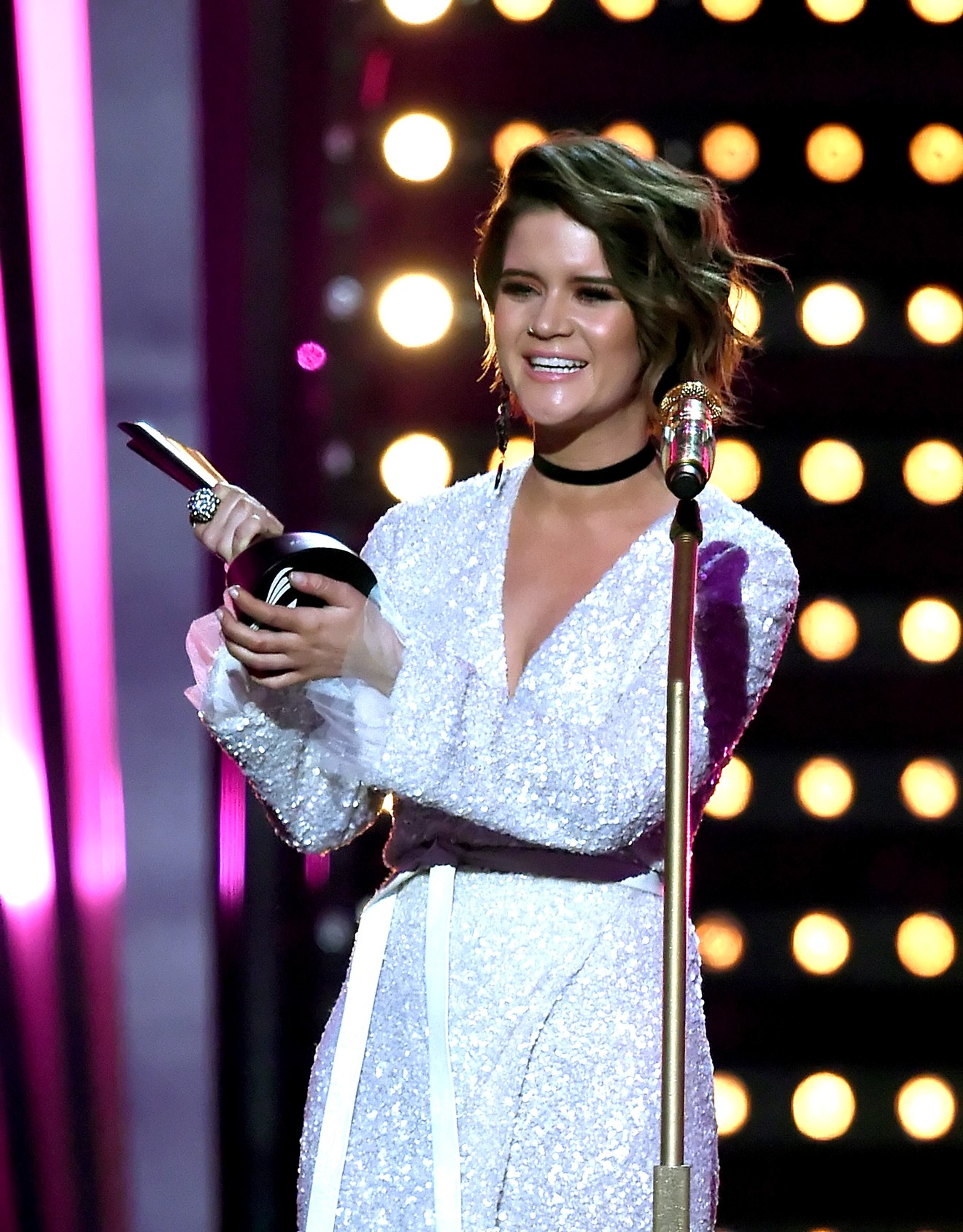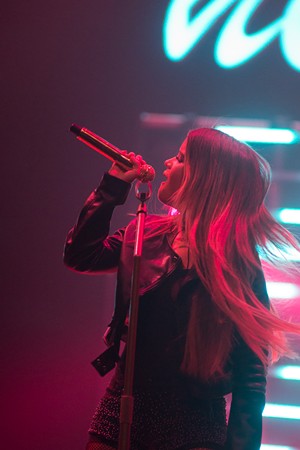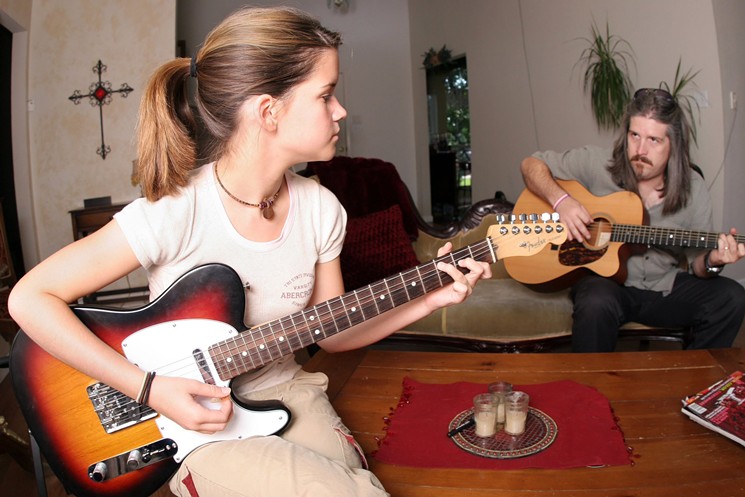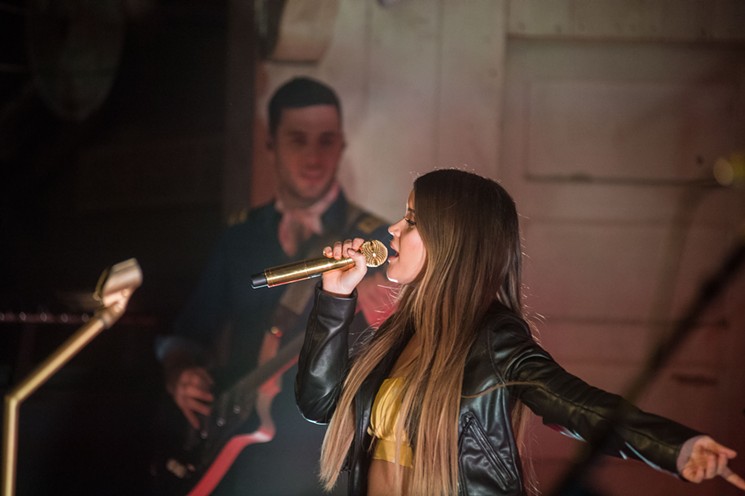Not all that long ago, Morris, who lives in Nashville and turned 27 on April 10, was one of the fans waiting in line outside venues like House of Blues. The past 12 months have seen her catapulted from unknown singer-songwriter to sensation. She released a major label debut, Hero, in June 2016 to near-unanimous critical acclaim. Her work earned a Grammy, a Country Music Association award and an Academy of Country Music award. A little over a week after her Dallas show, she’ll perform on national TV at the ACMs in Las Vegas to over 10 million viewers and collect an award for New Female Vocalist of the Year.“Country music is about real life shit, and if you listen to my album you can’t say it’s not that.” – Maren Morris
tweet this
“No one’s prepared for the rocket ship of getting famous,” Morris says to the camera, a giant Buddha statue off in the corner over her shoulder. She smiles as she speaks, her legs crossed at the ankles, hands folded in the lap of her black dress, lifting one occasionally to flip her hair back with a gentle tilt of her head. “It’s been a crazy year. But thanks to the people I have around me, I handle it a little better now.”
Off to the right side of the room, standing along the bar where all the booze is locked up behind cabinet doors, are Morris’ day-to-day manager and publicist from Sony’s Nashville office, which directly oversees her work with Columbia Records, the label she’s signed to. They hover silently in the background, making sure that Morris stays on schedule. Eventually the publicist walks up to the camera man and flashes two fingers to indicate how many minutes they have left. Then it’s on to the next interview.
A weather man from a Dallas TV station is nestled into one of the large brown leather sofas in the middle of the room. He's name-dropping mutual acquaintances and the bars where Morris played when she was still too young to drink. In the back of the room in front of a fireplace is another pair with a camera waiting their turn.
One of the last interviewers is Alaric “Big Al” Mack of The Kidd Kraddick Morning Show, who rattles off a number of Morris’ recent accomplishments and pieces of personal biography: Her first performances playing Johnnie High’s Country Music Revue; the semester she spent in college (she and Mack went to the same school, and neither finished); her appearances on CMT Crossroads and at the Grammys duetting with Alicia Keys.
After the interviews are over and the camera crews have been shuffled out the door, Morris sits down in a corner nook full of colorful pillows that match the tapestries on the walls. “We know how to compartmentalize them, for sure,” Morris says of her rapid-fire interview schedule.
Then, as though on cue, her publicist appears once more, this time to ferry Morris off for a meet-and-greet where dozens of fans paid for one-on-one time with the local-girl-made-good, with proceeds going to the fine arts program at her alma mater, James Bowie High School.
Standing next to the publicist this time is Morris’ father, Scott, who was putting in the hours alongside his daughter years before there were sold-out crowds or members of the media queued up to see her. He, as much as anyone, knows that Morris’ journey started long before her breakthrough single, “My Church,” went platinum and put her at the center of a new generation of artists who are redefining country music.
“It’s crazy to see the journey that song has taken me on,” Morris tells the Dallas Observer. “It basically kick-started my entire career. But the fact that I was the writer on that song and had been a songwriter for other artists, it proves that this story has been in the furnace for so long. This song just took it on a rocket ship ride.”
The beginnings of Morris’ steep career trajectory can be traced to one square block in downtown Arlington. It was there, where Center and Mesquite streets intersect Front and Division, that she first performed on stage to an audience at the age of 11, and later spent countless hours hosting song swaps and playing with her band as a teenager. It’s also where the family business, Maren Karsen Salon – named for Morris and her younger sister – is located.
“It didn’t seem like this far away dream.” – Maren Morris
tweet this
Morris’ parents, Scott and Kellie, both grew up in Dallas and met when they worked at Cadillac Bar, while he was finishing college and she was doing an apprenticeship as an Aveda hair stylist. Morris was born on April 10, 1990, and her sister Karsen came along three years later. Kellie opened a hair salon of her own in 1996 (the current location is the third one they’ve had, which is where they’ve been for four years now) and as they got older, both girls would help work the front desk and do administrative work.
When Morris was little, Kellie’s salon would host barbecues and holiday parties for her staff at the family home, and a frequent feature of the parties was a karaoke machine provided by her godfather. It was at one such party that Morris, then only around 9, first demonstrated a gift for singing. “At one point, they were like, ‘Did somebody turn the radio on?’ and walked into the other room where I was,” recalls Morris, who was singing LeAnn Rimes’ “Blue.” “They were like, ‘Oh shit, it’s our kid singing.’”
Her father says he recognized her skills as rare. “We were like, ‘Wow, that’s coming out of her,’” says Scott. He is the social butterfly to the more reserved Kellie, standing out immediately for his long, pepper-gray hair, even though he’s not much taller than his “five-foot-nothing” daughter. “It kind of floored us. We were like, ‘Hmm, there’s something there. We might want to pursue that.’”
Rimes, a singing prodigy who grew up in Garland, was an early inspiration for Morris, having released her major label debut when she was only 14 years old. “I was obsessed with LeAnn Rimes as a kid. I really looked up to her because she was only a few years older than me. It didn’t seem like this far away dream,” says Morris who, though a country fan from a young age, also grew up listening to Sheryl Crowl, the Spice Girls and N*SYNC. “It really got me into the idea that I already love to sing, so let me go to this music revue where [Rimes] got her start.”
That music revue was Johnnie High’s, a weekly opry-style talent show at the Arlington Music Hall, which is across the street from the back parking lot of the present-day Maren Karsen Salon. For over 35 years, High’s gave young singers like Rimes, Lee Ann Womack, the Dixie Chicks and Kacey Musgraves some of their first opportunities to sing in front of a live band.

A photo of Maren Morris performing in 2002 hangs in the hallway of Poor David's Pub in Dallas.
Brian Maschino/Courtesy of Poor David's Pub
Morris, a shy and introspective kid who played soccer in high school but gravitated toward creative writing and art (Scott still praises portraits she drew of ’60s icons Natalie Wood and Audrey Hepburn), says she “always felt really at home on stage,” including doing theater. “Whether I’m being myself or playing a character, there’s this wall between your shyness and people judging you. Because I’ll be myself on stage tonight, but there’s this sort of armor you put on when you get out there and that always really interested me and I felt protected by it,” she says. “You’re exposed, but there’s this sort of toughness you put out so that you can amplify your personality for the masses.”
Before long, Morris was writing her own music – at that point, just lyrics that she sang to a melody, since she didn’t know how to play any instruments. When she was 12, Scott got her her first guitar, an acoustic Ibanez, and taught her a couple chords. By that time, Morris already had her own backing band and was playing around DFW, her first proper show having been at Fort Worth honky-tonk White Elephant Saloon.
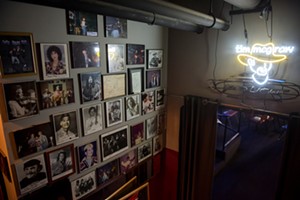
Photos of performers hang at Poor David's Pub, including a portrait of Maren Morris when she performed there as an 11-year old.
Brian Maschino
By that time, Morris was already a touring musician. Music was a family affair, with Scott playing the part of roadie, booker and manager, and even Karsen helping to sell merch. “I couldn’t tell you all the ends of Texas I’ve seen. All the places you didn’t know existed; I played all over,” Morris says. “Music was always this weekend job that I had while the rest of my friends were going to slumber parties. It never seemed abnormal that I was singing in bars on weekends because that’s just what I’d been doing for so long at that point.”
Morris took every opportunity that came her way, including attending the first-ever Grammy camp outside Los Angeles when she was 16. The camp gave her the chance to attend workshops with industry people including David Foster, Paul Williams and Jimmy Jam. It was also the first time she flew on a plane by herself. She self-released three solo albums, held down an open mic gig at Grease Monkey in the same strip as her mother’s salon and even found time to join a rock band called They Were Stars, where she played keyboard and sang harmonies.
“I think she worked a lot more than she let on,” says Taylor Tatsch, who began playing guitar with Morris when she was 15 and briefly joined her in They Were Stars. “You wouldn’t think she’d be doing stuff and then she would call you up and be like, ‘I got six new songs.’ And you’d be like, ‘Holy crap, when did you get the chance to write six new songs?’”“I’ll be myself on stage tonight, but there’s this sort of armor you put on when you get out there.” – Maren Morris
tweet this
While Morris was self-motivated from a young age, Scott admits he and Kellie sometimes worried that they were pushing her too hard. “There were times when she was like, ‘I just want to go to bed,’” he says, imitating a cry voice. “She probably appreciates that more now because of everything she did go through, every step she went through, to get where she is now.”
As Morris hit her late teens, there were increasing frustrations to deal with. She auditioned for every reality show she could find – American Idol, The Voice, America’s Got Talent, Nashville Star – and was rejected from all of them. In the case of American Idol, for which she auditioned at the old Cowboys stadium, she barely got 10 seconds at the cattle call audition. She rolls her eyes at the memory. “I was heartbroken at the time. I thought, ‘I can’t even get onto one of these? What is wrong with me?’” she says. “Now I see contestants on the show singing my songs and I feel vindicated.”
Scott takes particular pleasure in his daughter having proven the judges wrong over time. “I think by that point she was just saying eff it, and I was right beside her,” he says. A smirk forms beneath his black mustache. “It turned out to be a blessing in the end. Who knows what would’ve happened? She could’ve gotten locked into something like that, so we’re very happy they had bad taste,” he adds, laughing.
Eventually it became clear that Morris had gone as far as Texas could take her. “I remember taking CDs to a lot of local record labels, and it was really tough for a girl. For a guy, you can trip that line of being a little alt country, a little Texas country, a little rock ’n’ roll. It seems like with a girl, you’re either a twangy country girl or you’re something else,” says Tatsch. “It became apparent she was really getting kind of discouraged by the whole thing. She was trying to figure out, ‘Do I need to go to college? L.A.?’ And Nashville just kept coming up.”
When she was in her early 20s, Morris, who had spent one semester at the University of North Texas in Denton, paid a visit to Mineola native Kacey Musgraves, whom she’d met on the Texas country circuit when they were both teenagers, in Nashville. “I love Texas, but I was sort of just getting into this cyclical touring, never really writing, and I just wanted to get out,” she says. “[Kacey] opened that door and was like, ‘You should just come up here, you’ll love it. You love to write, you’ll learn so much from the songwriters up here.’ I could just already see myself there and really liking it.”“I see contestants on American Idol singing my songs and I feel vindicated.” – Maren Morris
tweet this
So Morris, still the shy kid at heart, decided to take a leap: Having saved up a couple thousand dollars, she found a “creepy Craigslist apartment,” loaded up a U-Haul, and drove to Nashville with Kellie, where she vowed that she would give herself a year to land a job with a songwriting house or else come back home to Texas.
“I had to scare myself,” she says. “I didn’t have any of the strings of Texas attached, because [otherwise] I’d be seen forever as the 16-year-old who toured around Texas forever.”
Morris wouldn’t need anywhere near the 12 months she gave herself to land a dream job in Nashville. After eight or nine months of networking, attending artists rounds and watching others perform at bars around Nashville, a public relations officer at BMI introduced her to Carla Wallace, co-owner and general manager of Big Yellow Dog Music.
Wallace, whose music house was about to see one of its writers, Meghan Trainor, score a No. 1 hit with “All About That Bass,” quickly signed Morris to a four-year contract.
“She was so unique as a writer. She just buried herself in writing every single day,” remembers Wallace. “It’s really unusual for a brand new writer to start writing and start writing with the town, which is really what Maren did. She wrote with a ton of people on Music Row, but did it every single day.”
Morris says she fell in love with Nashville’s songwriting industry, which gave her a chance to immerse herself not only in being creative but in collaborating with others. “You walk into a room, usually a two-to-three-person co-write, and have to write with zero ego, zero thoughts about how cool you are. You have to immediately walk in and be a team player because the goal is to write a great song together,” she says.
By her own admission “burned out” from more than a decade of performing, she enjoyed burying herself in others’ work: “I never had any qualms writing for someone else,” she says. “I wanted to do that, I wanted to be a hot shot songwriter for Miranda [Lambert] or Blake Shelton or Little Big Town.”
Her first major songwriting credit came in 2014 when she cowrote “Last Turn Home” for Tim McGraw. Early the next year, fellow Texan and American Idol winner Kelly Clarkson recorded her song “Second Wind.”
“People started hearing about her, the best writers in town, about how great of a writer she was, how great her voice was, how great her ideas were,” says Wallace.
Not all of her songs fit for other artists, however. “She kept turning in all these songs and they were just mind-blowing, like, ‘This is so freaking cool. There’s nobody in town that’s this cool, that’s doing what you’re doing.’ And by that I even mean artists for us to pitch the songs to,” Wallace says. When she surprised her coworkers with a rendition of Beyoncé’s “Halo” during a Christmas party at the Wild Beaver, a karaoke bar in Nashville, Wallace was convinced Morris needed to return to performing herself. “But she wanted to find her song, her true song that she wanted to bring to the world. And that was ‘My Church.’”
Morris wrote “My Church” in March 2015, when Morris and Wallace were in Los Angeles for a songwriting session with busbee, a songwriter and producer who had already scored hits with Shakira, Timbaland and Lady Antebellum.
The pair would listen to the demo while they cruised along the Pacific Coast Highway. “I just had this immediate gut feeling, ‘Do not send this to anyone. Protect this,’ because I didn’t want anyone else’s voice on it but my own,” Morris remembers. “It’s just so true to my story, and that revived feeling of being in a car, feeling this feeling of not having any aim or direction to go, but you’re steering.”
A swaggering revival meeting of a tune, “My Church” wrapped up Morris’ love for country music – Hank Williams bringing the sermon, Johnny Cash leading the choir – in the unapologetically cursing, drinking, walk-of-no-shaming persona that would become the hallmark of her writing. It’s a testament to Morris’ faith in the salvation of music and getting lost on the open road. “There’s something really American about that to me, just having a stretch of road, the radio’s on and you don’t know what song’s coming on next,” she says. “That’s always been a really romantic thing to me.”
Armed with the song she believed to be her destiny, Morris returned to Nashville, releasing a self-titled, five-song EP to Spotify that August. Earning 2.5 million plays in a month, Morris charted on Billboard and soon had interest from several labels. Once again, she was determined to move forward on her own terms. “A couple labels put offers on the table, but I didn’t really love either. Then Sony came along and had a really aggressive offer. They were like, ‘We’ll release the single within two months, we’re not going to shelve you, we’re not going to make you wait,’” she says. “I was like, ‘There’s not artist development you need to do here. This is it, take it or leave it.’ And they were very supportive of it.”
After signing to Columbia in September, the EP was re-released in November and “My Church” was issued as a single in January 2016, with a full-length album, Hero, following in June. With similarly radio-friendly songs such like “80s Mercedes,” R&B-infused slow-burners like “Once,” and tough-talking screeds of empowerment like “Drunk Girls Don’t Cry,” Morris was praised as a versatile singer with a fresh perspective. “I absolutely think she’s bringing some change with her for sure,” says Wallace. “She can write anything, so the style of music that’s going to come out of her is going to be whatever she might be interested in at the time.”“It’s 2017. I think it’s not that big of a deal that I’m talking about drinking or being young and not necessarily ready for marriage.” – Maren Morris
tweet this
Morris shrugs at the idea that there’s anything unusual about the subject matter she sings about. “Maybe I’ve got delusions of grandeur, but it’s 2017. I think it’s not that big of a deal that I’m talking about drinking or being young and not necessarily ready for marriage. I’m in a window where a lot of 20-somethings are,” she says. “No one was really saying that from a female perspective to me.”
Musgraves, who also made a name for herself as a songwriter before enjoying solo success, is proud of Morris. “I remember being 12 or 13 years old down in Texas and being blown away by this tiny girl with such a huge voice. Fast forward about eight years and we’d become friends and she would make trips to Nashville and stay with me. She eventually made the leap and found her footing really fast,” says Musgraves, whose major label debut, Same Trailer Different Park, won the Grammy for Best Country Album in 2014. “That’s pretty rare and a cool thing to see happen to such a great songwriter.”
The year since Hero’s release has been “like Groundhog Day, in a good way,” according to Scott: Morris opened for Keith Urban on a stadium tour, performed on Saturday Night Live, won best new artist awards from the Country Music Association and Academy of Country Music, and took home a Best Country Solo Performance trophy at the Grammys for “My Church.” While the album has only sold 200,000 copies domestically, it appeared near the top of almost every major end-of-year album list, even topping the one from Rolling Stone Country –despite the fact some fans insist she’s not really country.
“Yeah, I listen to my record and I’ll be the first to tell you this is not just country,” she says. “[But] country music is about real life shit, and if you listen to my album you can’t say it’s not that, so that’s country to me.”
What stands out most to Morris from all those milestones, however, is when she played American Airlines Center opening for Urban last fall – a room where she was once one of the 20,000 fans watching from afar. “I took one of my in-ear monitors out for ‘Church’ at the end where there’s this big a cappella singalong chorus, and having that big of a room – in my home state, where I grew up – singing back to me, I lost it up there,” she says. “I felt like I was home and I did something huge.”
Two days after Morris’ show at the House of Blues in Dallas, a line of people stretches down the street and around the corner in front of Gruene Hall. Located in the sleepy hamlet of New Braunfels, a half hour outside Austin, it’s the oldest continually operating dance hall in Texas and a rite of passage for any country singer from the Lone Star State. Morris insisted on being able to play here, and spent the afternoon having lunch with her extended family.
It’s a brief break from her busy schedule: A week prior, Morris released a deluxe edition of Hero with a handful of previously unreleased tracks, including “Bummin’ Cigarettes” and “Company You Keep,” two songs she now includes in her live sets. The following week, she’ll release a new duet with Thomas Rhett. Tonight’s show also features a cover of “Greener Pastures,” an ode to marijuana she co-wrote with the Brothers Osborne, one of the many artists in her tight circle of friends in Nashville.
“It really feels like this modern-day Chelsea Hotel where all of us are different, none of us are competing against each other. We all have our own lane, but we’re all here to support each other when we need it,” Morris says of her Nashville crew, which includes Musgraves and her boyfriend, Ryan Hurd, another songwriter-turned-up-and-coming artist. “It’s really fun to come up with a group that’s so tight knit, and have some of us representing Texas.”
That night, the 140-year-old wooden walls of Gruene Hall shake from the cowboy boots that stomp their approval for the young star onstage. As Morris reaches “My Church,” the room hits a revival-worthy pitch that threatens to blow the tin roof off the place, but her voice soars over the noise and comes through clear as day.
“At the end of the day, when I feel most at home is when I’m onstage singing. It’s transcendent, really cathartic. Whether I wrote the song or not, I just love to sing,” Morris says. “All the business bullshit aside, that’s the most pure form of creation that I have to give to the world.”

